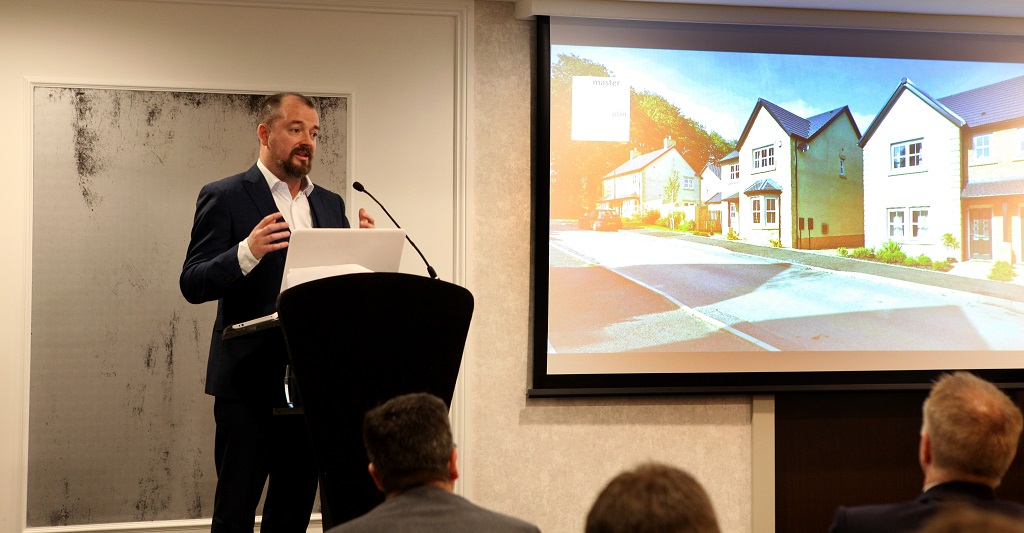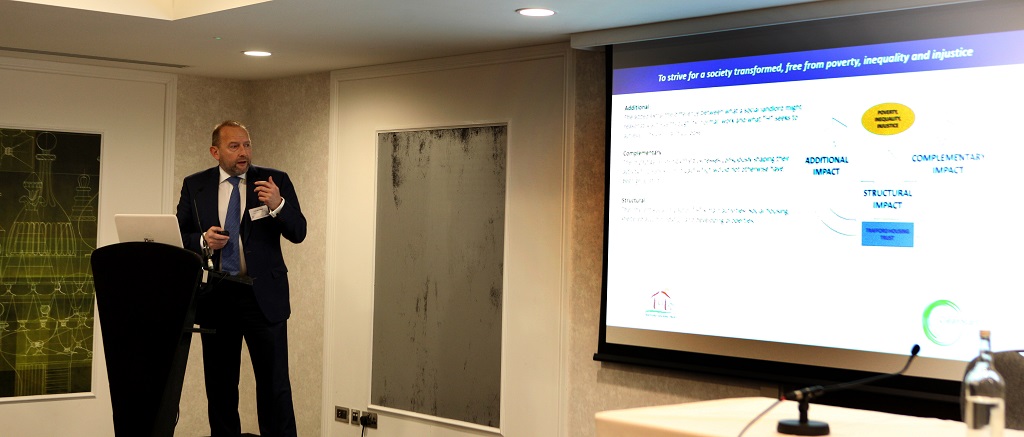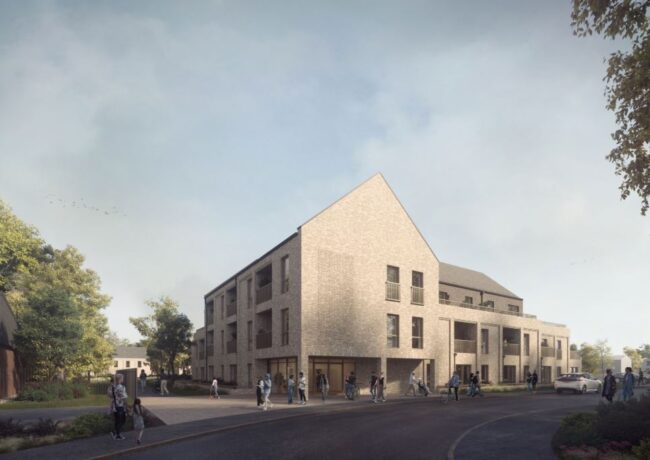Event Summary
Boylan: We need to take greater development risk
The incoming chief executive of the Greater Manchester Combined Authority told the Place RESI audience local authorities were in agreement: in order to hit new housebuilding targets, “we will only deliver on our ambition if we take greater development risk.”
 Eamonn Boylan, currently chief executive of Stockport Council, said Greater Manchester’s local authorities were set to get “much more involved in direct commissioning” of homes to speed up delivery and meet the requirements of the draft Greater Manchester Spatial Framework which sets a goal of 11,300 new homes each year.
Eamonn Boylan, currently chief executive of Stockport Council, said Greater Manchester’s local authorities were set to get “much more involved in direct commissioning” of homes to speed up delivery and meet the requirements of the draft Greater Manchester Spatial Framework which sets a goal of 11,300 new homes each year.
Boylan said the Combined Authority would be working with Greater Manchester housing providers to optimise “their capacity and their appetite” for investment, and that large housebuilders alone would not be able to “deliver the scale of growth that we need, at the speed that we need it.”
He told the audience:
- Greater Manchester Housing Investment Fund was close to committing £300m to deliver nearly 6,000 homes
- There was significant investor interest in the market, as demonstrated in the Manchester Life partnership between Abu Dhabi United Group and Manchester City Council, delivering “fantastic transformation” in East Manchester with 1,000 homes in the first phase of development at New Islington
- It was “critically important” to improve links between housing, health and social care
- Greater Manchester would be seeking more powers from Government to help address the skills gap in construction
- The Combined Authority was in negotiations with Government to bring together different funding pots to support housing and employment
Around 150 property professionals gathered at the Holiday Inn in central Manchester for Place North West‘s half-day conference, sponsored by Lovell, PPS Group, Barton Willmore and Kingsley.
See below for gallery + slides
Boylan spoke alongside Zoe Ensor, partner at PPS Group; Dan Mitchell, partner at Barton Willmore; Stephen Tucker, partner at Barton Willmore; Tahreen Shad, business development manager at Lovell Partnerships; Adam Higgins, co-founder at Capital & Centric; Stephen Hodder, chairman at Hodder + Partners; Deborah McLaughlin, head of housing & strategy at GL Hearn; Paul Westhead, head of property business development at Trafford Housing Trust.
Discussions around the GMSF, masterplanning, community consultation, land supply, and the role of housing associations featured throughout the course of the morning.
Changing culture around planning for housing
Dan Mitchell and Stephen Tucker from planning and design consultancy Barton Willmore explained that while housing targets were important, without a major change in culture around planning for housing, there was a strong danger of “burning ourselves out” on housing growth within 10 years. They explained:
- The North West was only building 46% of the homes it needed, and has taken 10 years to get back to pre-recession rates of housebuilding
- The way we live our lives is changing rapidly, meaning we need to give more consideration to where the new economies and communities will be in 30 years’ time
- If local authorities want to see great masterplans the public sector needed to be brave in allocating “bigger, more ambitious and more controversial” sites
- “Forward-thinking” work in Greater Manchester was not being adopted in other areas

Zoe Ensor, PPS Group
Securing buy-in for schemes
The importance of public consultation on new housing schemes was highlighted by Zoe Ensor from PPS Group, who said that while there is no legal requirement for developers to consult, securing community buy-in created better planning outcomes, a smoother construction process and a platform for selling homes. She added:
- Social media has empowered communities and turned them into a “potent force”
- Communities are naturally resistant to change and NIMBYism is still a challenge
- 53% of councillors think they have significant influence over council planning panels and 86% do not view developers positively
- It is increasingly important to “control the narrative” around schemes, meaning developers should engage early with key decision-makers and promote community benefits of their projects
Land, finance and skills challenges
GL Hearn’s Deborah McLaughlin said historic funding challenges had been solved with developers now able to access an “unprecedented” £28bn of Government money. Availability of land remained the biggest obstacle in bringing forward new homes. She said:
- The public sector was providing opportunities to access land with the Ministry of Defence, Ministry of Justice and Department of Work & Pensions tasked with freeing up sites
- Proposed mergers between up to 80 further education colleges will create land availability in “great residential locations”
- The NHS is shrinking its estate to create savings of £2bn, with land earmarked for redevelopment
- Asset rich corporates, such as supermarkets and utility companies, are re-evaluating their estates, while the new digital economy means that less land is needed for retail
- The skills shortage will put more emphasis on off-site construction as developers find new ways of delivering homes
 Bridging the gap between public and private
Bridging the gap between public and private
Trafford Housing Trust’s Paul Westhead told the audience the Trust was exploring partnership opportunities to deliver more homes across a variety of tenures:
- Trafford Housing Trust set up Laurus Homes in 2014, with all money made going to support the social ambitions of the Trust
- An Old Trafford Land Pooling Agreement and Planning Performance Agreement with Trafford Council have brought forward a considerable amount of land for development
- The Trust was the first housing association to access the Greater Manchester Housing Investment Fund for a 41-home scheme at Woodfield Road in Altrincham. It also become the first organisation to repay the HIF money
- Last year, the Trust announced a £160m partnership with one of England’s biggest housing associations, L&Q, to build 2,000 homes over four years. 50% of the homes will be open market sale and 50% will be affordable
Tahreen Shad from Lovell Partnerships said that the firm was looking to capitalise on partnership working and was:
- “Heavily investing in Manchester” by building nearly 2,000 homes, while moving into Cheshire and Lancashire
- “Exploring opportunities” in Merseyside with housing association Riverside, with a current joint venture having already delivered around 1,000 homes
- Currently unable to build fast enough due to the skills gap and was therefore “exploring modular,” with plans for its first off-site scheme
Manchester’s residential design quality
Following the approval of the Manchester Residential Quality Guidance by Manchester City Council in December, Stephen Hodder, chairman of the sounding board that developed the guide, gave the first public presentation on the 140-page document. He told delegates that more space, more light and more privacy were the priority for homeowners and tenants:
- Prior to Manchester temporarily adopting the London Housing Design Guide standard, new home sizes were around 10% lower than in the capital
- When developing the Manchester guide the panel wanted to be less prescriptive than the London version and recognise that design was not just about the house, but “the way in which people live”
- Developers will now be encouraged to retain design teams throughout an entire project, and come up with comprehensive plans for ongoing management of schemes
Adam Higgins, co-founder at Capital & Centric, delivering the £250m Kampus development in Manchester city centre with Henry Boot, said that he was initially sceptical of creating more red-tape for developers, but instead saw the Manchester Residential Quality Guidance as an “inspirational document” and said that his schemes were benefiting from the guide. He added:
- Space sizes and specs set out in the design guide were “entirely achievable” and could be hit “with a bit of work,” without impacting on the viability of schemes
- Projects that had not complied with the guide were already starting to look “dated,” while those that were now following the guide would be worth more in the future
- Demolition work on the 530 apartment Kampus site was now underway with work on the new building set to start in July 2017
- The tender process is about to be launched on the 200,000 sq ft Crusader mill complex near Piccadilly Station, while work on the 166 apartment project at The Place in Manchester is set to start on site in April 2017
To view the presentations from the event, visit our SlideShare page
Click any image below to launch gallery
- Eamonn Boylan, Stockport Council
- Eamonn Boylan, Stockport Council
- Dan Mitchell, Barton Willmore
- Stephen Tucker, Barton Willmore
- Zoe Ensor, PPS Group
- From left: Zoe Ensor, Tahreen Shad, Eamonn Boylan and Dan Mitchell
- From left: Zoe Ensor, Tahreen Shad, Eamonn Boylan, Dan Mitchell
- Deborah Mclaughlin, GL Hearn
- Paul Westhead, Trafford Housing Trust
- Paul Westhead of Trafford Housing Trust
- Stephen Hodder, Hodder + Partners
- Adam Higgins, Capital & Centric
- From left: Paul Westhead, Stephen Hodder, Deborah McLaughlin, Adam Higgins
- From left: Paul Westhead, Stephen Hodder, Deborah McLaughlin, Adam Higgins
- Stephen Hodder and Deborah McLaughlin



























Design guidance in Manchester is too wishy washy leaving numerous loopholes that allow MCC to let the developer off the hook.
There is good reason for it to be prescriptive otherwise it’s not worth the paper it’s written on.
By Drop in ocean